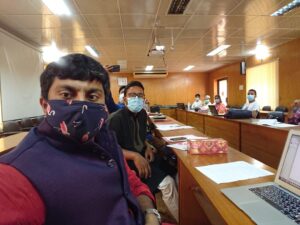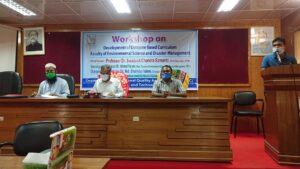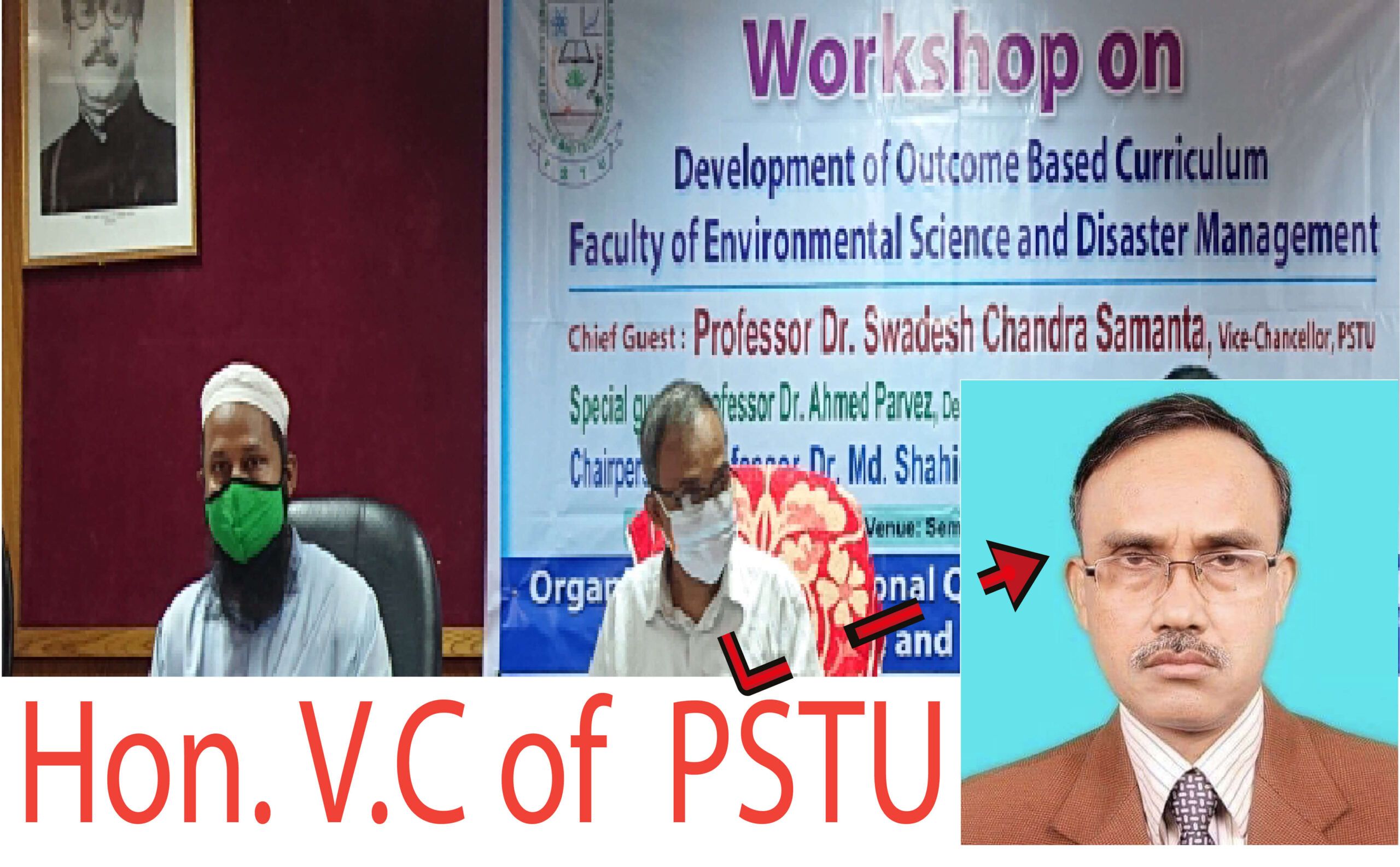Outcome Based Curriculum
Honorable V.C. of Patuakhali Science and Technology University, Prof. Dr. Swadesh Chandra Samanta, delivered his speech as a Chief Guest of the program workshop on the “Development of outcome-based curriculum organized by the Faculty of ESDM Dated 25 May 2021” and inaugurated the 2-days, day-long program event in this covid-19 situation at PSTU campus.
The program maintains social distance with proper sanitation abiding by the rules of safe health of Govt. of Bangladesh. In the workshop Special guest Prof. Dr. Ahmed Parvez chaired by Prof. Dr. Md. Shahidul Islam, Director, IQAC, and the senior and junior teachers were present at the PSTU agriculture conference room.
Honorable VC stated that an outcome-based curriculum is very important for the faculty of Environmental Science and Disaster Management because the employer may have asked the graduate whether they develop their curriculum as outcome-based or not.
Bangladesh’s Govt. recently focused on the universities to develop their curriculum with an outcome-based to make the graduate a skilled citizen for the wellbeing of the nation of Bangladesh.
Outcome-based curricula deal with the skill of the job seeker.
In Bangladesh, foreign experts are getting money from Bangladesh. Graduates are losing dollars not to make them skilled proposed by the employees of Bangladesh, not only in agriculture but also in other sectors.
Hence the outcome-based curriculum needs to develop here in the faculty of Environmental Science and Disaster Management. Experts usually ask for a unique idea regarding education or other sectors.
Not only Environmental Science and Disaster Management (ESDM) but other faculty focused mainly on theoretical study but few practical work. We need practical learning, not only the theory. At Khulna University, the undergraduate students are doing excellent research. Hence, we need an outcome-based curriculum for more practical and more socially engaging learning.
The lab needed to get more instruments and all the teachers should ask for the instruments and requests for the scientific instruments and make a procurement if they really need the instruments.
Unless the university can use the proposed money, then the Bangladesh Govt. will use that money for another purpose, like, COVID-19. What is the outcome-based curriculum? What are the students able to do? This is the vital question now.
The curriculum is a plan in a discipline and a time frame that makes a professional learner. A curriculum design should be reviewed periodically and every four years must need to review a curriculum and All the faculty members should be involved and even the students can take part in the development process.
Outcome Based Curriculum
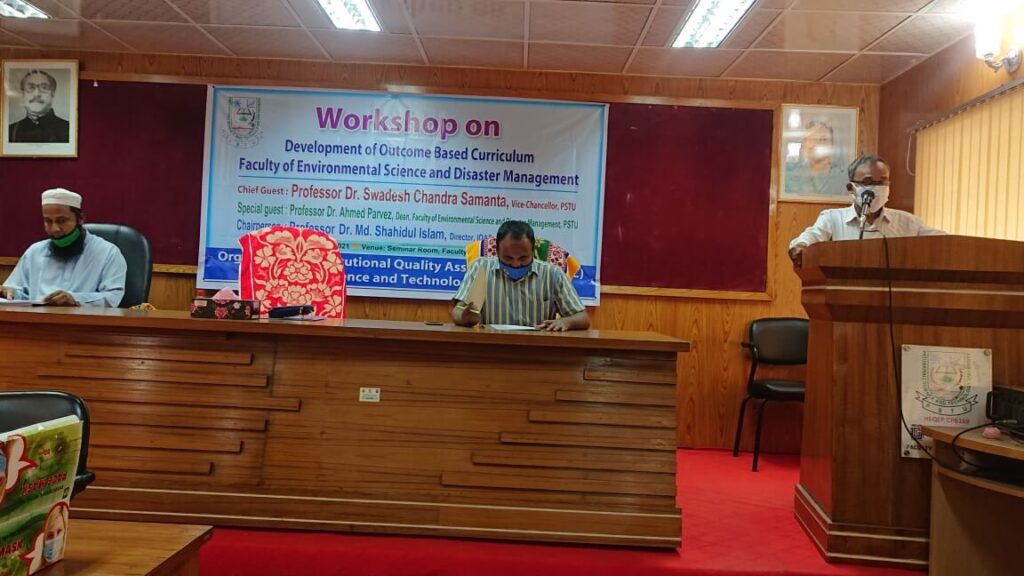
Outcome based education
Bloom’s taxonomy is one of the best ways to classify knowledge in domains like cognitive, affective, and psychomotor. By knowing the three domains of knowledge, a teacher can realize and find a way to teach a student effectively.
The recent trends of outcome based education is very essential to all institutions. Application of the outcome based education can be the best method to improve the teaching-learning environment of an institution. What does it cover?
Outcome based education is the way of teaching of a disciple in a given time period. It is based on the outcome of the teaching-learning in which a student will gain from a given course. The program will be set up based on the outcome. The program objective will be synchronous with the vision and missing of the University.
Outcome based education
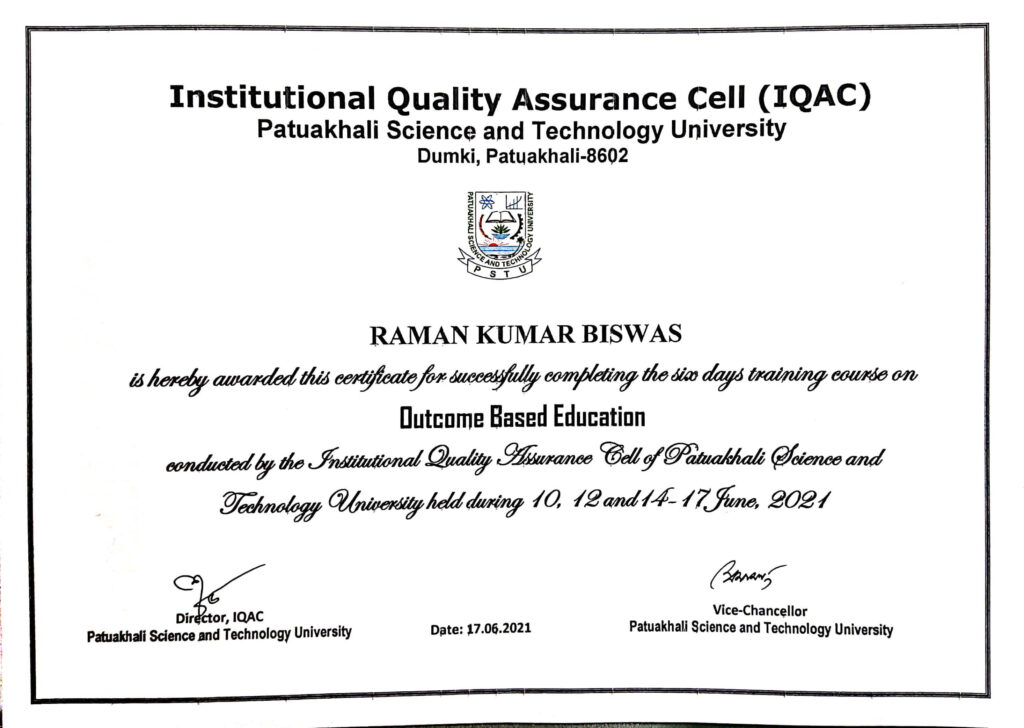
Outcome Based Syllabus
PLP-311 (Theoretical) and 312 (Practical); Principles of Plant Pathology
Lecture Discussion Theoretical: Two 50-minute lectures per week.
Practical: One 100-minute exercise per week.
Number of credits: Theoretical-2 and Practical-1
Contact Hours: 2 x 50 minutes for lecture (2 credits) and 1 x 100 minutes for laboratory exercise (1 credit) per week
Semester: 5th
Course Teacher Information in the Outcome Based Syllabus:
Cell Phone: ……….. e-mail:
Office Hours: 09:00 AM to 5:00 PM daily
Learning Outcomes Applying in the Outcome Based Syllabus:
By the end of the course, students will be able to;
Knowledge and understanding
Describe the causes of plant diseases in general
Discuss the pathogenicity process for economically important plant pathogens and understand how plants and pathogens interact in the environment.
Applying knowledge and understanding
Explain the interactions that occur among the plant, the environment, and biotic and abiotic agents during disease development
Identify and recognize symptoms and signs and formulate a hypothesis about the etiology of the disease
Diagnose and explain the management of key diseases
Making judgments
Identify the proper diagnostic technique and plan a strategy for disease management.
Evaluate critically the advantages and disadvantages of various plant protection strategies.
Communication skills
Improve their communication skills during discussions in the lectures and exercises.
Course Description of Outcome Based Syllabus:
This course is designed for undergraduate students in their fifth semester. In this course, students will learn the principles of plant pathology through lectures demonstrations and exercises in the laboratory.
Lectures will include information concerning the history and importance of plant pathology, infection process, host defense mechanism, disease management strategies microorganism interactions, and epidemiology and forecasting of plant diseases.
In the hands-on laboratory period, the student will learn laboratory skills, gain experience using the microscope, work with microorganisms, learn diagnostic skills, and be able to recognize plant diseases.
How to create a Lecture Schedule for Theoretical Class based on the Outcome Based Syllabus
| Date | Lecture | Title |
| 1 | Plant Pathology: Introduction and History | |
| 2 | Introduction to terminology related to Plant Pathology. | |
| 3 | The disease triangle and disease tetrahedron. | |
| 4 | Symptoms and Sign of plant diseases | |
| 5 | Field visit | |
| 6 | Stages in Plant Disease Development | |
| 7 | Stages in Plant Disease Development | |
| 8 | Stages in Plant Disease Development | |
| 9 | Dissemination and Survival pathogens | |
| 10 | Toxins in plant disease development | |
| 11 | Enzyme and plant growth regulator in plant disease development | |
| 12 | Defense mechanism of Plant against pathogen | |
| 13 | Effect of pathogenesis on different physiological process of the host | |
| 14 | Mid term Exam | |
| 15 | Effect of environmental elements on plant disease development | |
| 16 | Field visit | |
| 17 | Principles of plant disease management | |
| 18 | Principles of plant disease management | |
| 19 | Methods of plant disease management | |
| 20 | Biological control of plant disease | |
| 21 | Cultural control of plant disease | |
| 22 | Chemical control of plant disease | |
| 23 | Chemical control of plant disease | |
| 24 | Disease resistance and therapy | |
| 25 | Regulatory and Physical control of plant disease | |
| 26 | Integrated Disease Management (IDM) | |
| 27 | Regulatory and Physical | |
| 29 | Plant Disease Epidemiology: Elements of epiphytotic and their interaction in developing epiphytotic | |
| 30 | Plant Disease Epidemiology: Modeling of plant disease epidemics . | |
| 31 | Computer simulation of epidemics. | |
| 32 | Recap/ Summary of the Course, Quiz/ Post Assessment |
Note: The schedule may be modified during the semester. You will be notified in lectures and/or by email of any substantial changes to the schedule above.
Schedule for Laboratory exercise based on the Outcome Based Syllabus
| Date | Exercise | Title |
| 1-5 | Study of symptomatology | |
| 6 | Study of schematic drawings of different structures of plant pathogens | |
| 7-8 | Study of plant disease diagnosis process | |
| 9-10 | Study on some non-infectious diseases of plants. | |
| 11-16 | Pathogenicity test (Koch’s postulates) |
What is a Teaching format based on the Outcome Based Syllabus :
In the lectures, the topics will be dealt with by the lecturer supported by PowerPoint Presentations. The Presentations will be available in the course reserve collection database of the Faculty one day after each lecture. Additional material will be provided by the lecturer.
Exercises:
2 class hours will be used for field exercises, 2 for practical demonstrations and visits concerning the topics of agricultural meteorology and distribution techniques of pesticides, and 2 for diagnostic methods in the lab.
The remaining exercise hours will be used in the seminar room, in order to enable the students to find in the various databases active ingredients of pesticides, pesticides, labels, maximum residue levels, and safety sheets.
Course assessment:
Class Attendance: 10 Marks; Mid Term Exam. 20 Marks; Final exam: 70 Marks
Grading System:
| Numerical Grade | Letter Grade | Grade Point |
| 80 % and above | A+ | 4.00 |
| 75 % Less than 80 % | A | 3.75 |
| 70 % Less than 75 % | A- | 3.50 |
| 65 % Less than 70 % | B+ | 3.25 |
| 60 % Less than 65 % | B | 3.00 |
| 55 % Less than 60 % | B- | 2.75 |
| 50 % Less than 55 % | C+ | 2.50 |
| 45 % Less than 50 % | C | 2.25 |
| 40 % Less than 45 % | D | 2.00 |
| Less than 40 % | F | 0.00 |
Attendance Policy:
Your class attendance is strongly encouraged. By attending class you will be able to ask questions and assess your understanding of the topics we are discussing. We will also have in-class activities designed to help you learn the material and apply it to real-life situations.
If you must miss class due to illness, or family emergency you should let me know ahead of time, if possible, and you will only be able to make up missed midterm exams and in-class assignments if you provide me with a written excuse documenting the situation.
Practical Note Book: Reports on laboratory exercises are to be completed for each laboratory session and are to be handed in at the end of the laboratory period. The worksheet will be evaluated and handed back to you in the next laboratory period. If you miss a laboratory period you will not get credit for that laboratory.
Mid-term Examination format based on the Outcome Based Syllabus:
The Mid-Term exam is worth 20% of your final mark. It will take place during the regular 50-minute lecture period as per the schedule announced by the Dean’s Office. The Mid-Term exam will cover all material (including guest lectures) up to and including the 18 October lecture.
Practical Laboratory Examination: A laboratory examination will be held during the lab period on the date announced by the course teacher. This examination may utilize diseased plant specimens, microscope slides, photographs of pathogens and diseases, PowerPoint presentations, and/or other materials. Questions may include material from both laboratories and lectures. This laboratory exam is valued at 10% of your final mark.
Use of Personal Electronic Devices in the Classroom: The use of cell phones is allowed in the classroom for certain uses. Ringing cell phones will not be tolerated during lecture and practical sessions; Cell phones must be in silent mode. Students are not permitted to record any part of a class/lab/other session unless explicitly granted permission by the instructor.
Students with Disabilities: Patuakhali Science and Technology University is committed to assuring that all educational activities are free from discrimination and harassment based on disability status. The Department of Plant Pathology is committed to providing all students equal access to learning opportunities. If you need different accommodations than what is provided please let the instructor know as soon as possible. We are happy to work with you to provide and/or arrange reasonable accommodations.
Text Books & Reference used in Outcome Based Syllabus:
Plant Pathology 5th edition by G. N. Agrios
How to assessment students based on the Outcome Based Syllabus:
Attendance = 10%,
Mid-term exam. = 20% and
Final exam 70%
Course Expectations: You are expected to attend all lectures and laboratory sessions, be attentive during class, ask questions if you do not understand something, and participate in class activities and discussions. If you have questions or problems with the course please talk to one of your instructors as soon as possible. If at any time during the course, you feel we are not covering information you would like to cover or if we are going too fast over material please let your instructor know. This will not affect your grade.
Exam Policy
Students are expected to take exams at the times scheduled in the syllabus and or arranged by the instructor and the final exam at the time shown in the University of Minnesota calendar. Possible exceptions include serious illness, family emergencies or a legitimate conflict with recognized University activities. If you are unable to take an exam at the scheduled time please contact the instructor as soon as possible to make other arrangements.
If you miss an exam; Contact your instructor immediately. Students missing exams for valid (e.g., medical/bereavement) reasons must notify the instructor in advance, where possible, and provide documentation if requested.
If a student is able to sit the exam within 48 hours of the original exam time they may arrange to do so without penalty. If a student is unable to sit an exam within 48 hours of the original exam time they will have their final exam weighted proportionally more.
Students who miss an exam for a non-valid reason may request to take the exam within 48 hours of the original exam time, although they will have a 20% penalty deducted from their score. If a student is unable to sit an exam within 48 hours of the original exam time they will be assigned a score of zero for the exam.
Flipped Lectures
This class will be partially “flipped” this year. This means that some of the lectures will be recorded and available to view online. Your instructor will let you know what other class sessions will be flipped as the semester progresses.
For these flipped lecture sessions the expectation is that you view the recorded lecture material before coming to class. Typically during these flipped class periods, we will be having class discussions based on assigned readings or other types of small group activities.
Projects: Two projects are required and will be worth 50 points each. The methods to be used in each project will be covered in class.
The due dates of the projects are given in the lecture/lab schedule below.
My policy regarding late work is to deduct 10% of the assigned points for each calendar day an assignment is late. Thus, if a project is turned in two days late, the highest possible grade that will be given is 80% or a “B”. Additional details about each assignment will be given later in the semester.
Project 1:
(50 points) Collect and preserve six different specimens from the Basidiomycota. Three specimens should be identified as species; the remaining three should be identified as genera. Please, do not collect giant puffballs (they stink up the room).
At least three different families must be represented in your collection. In addition to the book you purchase, others will be available in the lab to assist you in identification. Each specimen should be dried and accompanied by a complete description of the specimen and the substrate on which it was found.
This project will give you practice hunting mushrooms and similar fungi and also allow you to become familiar with the literature and keys to their identification. Project 2: (50 points) Isolate and identify three pure cultures of fungi from different substrates.
Included in the collection should be one zygomycete fungus. You will be required to turn in detailed drawings of the important characteristics, as well as a Petri plate with the living fungus. This project will help you learn sterile technique, how to isolate and handle fungi from nature, and how to discern important microscopic characteristics of fungi.
Presentation/Poster: Students will be required to give a poster/presentation at the end of the semester on a topic related to Principles of Plant Pathology. Awards will be given for the best presentation.
Topics for the poster/presentation should be exciting, cutting-edge, not boring and Wikipedia-like essays, and need to be approved by the instructor by the stipulated time. Additional information on the presentation/poster will be provided later in the semester.
Outcome-Based Curriculum: Photos
